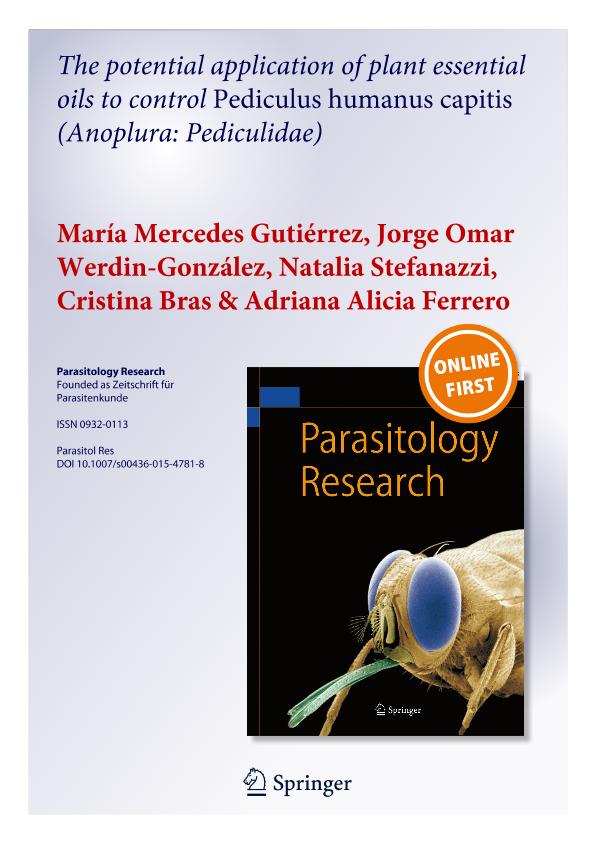Artículo
The potential application of plant essential oils to control Pediculus humanus capitis (Anoplura: Pediculidae)
Gutiérrez, María Mercedes; Werdin Gonzalez, Jorge Omar ; Stefanazzi, Natalia
; Stefanazzi, Natalia ; Bras, Cristina Liliana
; Bras, Cristina Liliana ; Ferrero, Adriana Alicia
; Ferrero, Adriana Alicia
 ; Stefanazzi, Natalia
; Stefanazzi, Natalia ; Bras, Cristina Liliana
; Bras, Cristina Liliana ; Ferrero, Adriana Alicia
; Ferrero, Adriana Alicia
Fecha de publicación:
10/2015
Editorial:
Springer
Revista:
Parasitology Research
ISSN:
0932-0113
Idioma:
Inglés
Tipo de recurso:
Artículo publicado
Clasificación temática:
Resumen
The human head louse, Pediculus humanus capitis (Anoplura: Pediculidae), is an ectoparasite confined to the scalp and human hairs. The repeated use of insecticides for the control of head lice during past decades has resulted in the development of marked levels of resistance. Natural compounds such as essential oils (EOs) have been suggested as alternative sources for insect control agents. In order to introduce a new pediculicide based on EOs, the effectiveness of the product and their effects on human being must be analyzed. In consequence, the biological activity of EOs from the leaves and fruits of Schinus areira (Anacardiaceae) and the leaves of Thymus vulgaris (Lamiaceae), Aloysia polystachya and Aloysia citriodora (Verbenacea) were evaluated against the eggs and adults of P. humanus capitis by fumigant and contact toxicity bioassays. Additionally, dermal corrosion/irritation tests were performed on New Zealand albino rabbits. In a fumigant bioassay, EOs from the leaves and fruits of S. areira were the most toxic against P. humanus capitis adults while these EOs and T. vulgaris were the most effective against the eggs. In contact bioassay, the EO from T. vulgaris was the most toxic against both stages. In the corrosion/irritation tests, the EOs did not produce dermal effects. According to the results, the essential oils from the leaves of T. vulgaris would be a valid tool for the management of P. humanus capitis. This EO produces a high knockdown effect in adults (followed by mortality) and toxicity in the eggs when it is applied for 21 min at a low concentration.
Palabras clave:
Head Lice
,
Essential Oils
,
Adulticidal
,
Ovicidal
Archivos asociados
Licencia
Identificadores
Colecciones
Articulos(INBIOSUR)
Articulos de INSTITUTO DE CIENCIAS BIOLOGICAS Y BIOMEDICAS DEL SUR
Articulos de INSTITUTO DE CIENCIAS BIOLOGICAS Y BIOMEDICAS DEL SUR
Citación
Gutiérrez, María Mercedes; Werdin Gonzalez, Jorge Omar; Stefanazzi, Natalia; Bras, Cristina Liliana; Ferrero, Adriana Alicia; The potential application of plant essential oils to control Pediculus humanus capitis (Anoplura: Pediculidae); Springer; Parasitology Research; 115; 10-2015; 633-641
Compartir
Altmétricas



